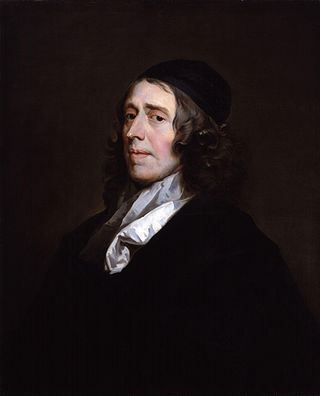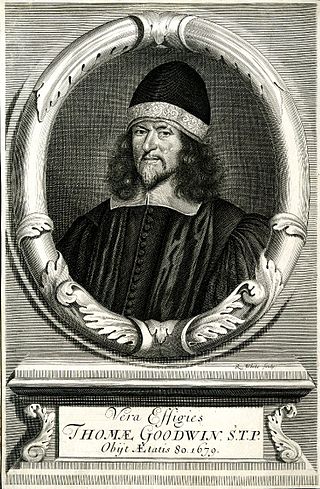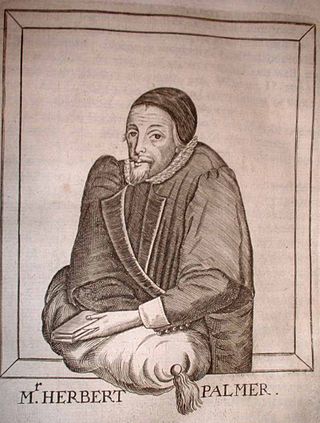Related Research Articles

John Owen was an English Nonconformist church leader, theologian, and academic administrator at the University of Oxford.
Stephen Marshall was an English Nonconformist churchman. His sermons, especially that on the death of John Pym in 1643, reveal eloquence and fervour. The only "systematic" work he published was A Defence of Infant Baptism, against John Tombes (1646).

Christopher Love was a Welsh Presbyterian preacher and activist during the English Civil War. In 1651, he was executed by the English government for plotting with the exiled Stuart court. The Puritan faction in England considered Love to be a martyr and hero.

John Goodwin (1594–1665) was an English preacher, theologian and prolific author of significant books.

Thomas Goodwin, known as "the Elder", was an English Puritan theologian and preacher, and an important leader of religious Independents. He served as chaplain to Oliver Cromwell, and was appointed by Parliament as President of Magdalen College, Oxford, in 1650. Christopher Hill places Goodwin in the "main stream of Puritan thought".

Philip Henry was an English Nonconformist clergyman and diarist. His son Matthew Henry was a notable commentator on the Bible and also a Presbyterian minister.
Anthony Burges or Burgess was a Nonconformist English clergyman, a prolific preacher and writer.

Ralph Venning was an English nonconformist Christian.
Joshua Hoyle was a Professor of Divinity at Trinity College Dublin and Master of University College, Oxford during the Commonwealth of England.
Lazarus Seaman, was an English clergyman, supporter in the Westminster Assembly of the Presbyterian party, intruded Master of Peterhouse, Cambridge, and nonconformist minister.

Herbert Palmer (1601–1647) was an English Puritan clergyman, member of the Westminster Assembly, and President of Queens' College, Cambridge. He is now remembered for his work on the Westminster Shorter Catechism, and as a leading opponent of John Milton's divorce tracts.
Christopher Feake (1612–1683) was an English Independent minister and Fifth-monarchy man. He was imprisoned for maligning Oliver Cromwell in his preaching. He is a leading example of someone sharing both Leveller views and the millenarian approach of the Fifth Monarchists. His violence was exclusively verbal, but he wrote against the Quakers.

Obadiah Sedgwick (1600?–1658) was an English clergyman of presbyterian views, and a member of the Westminster Assembly.
John Ley was an English clergyman and member of the Westminster Assembly.

William Greenhill (1591–1671) was an English nonconformist clergyman, independent minister, and member of the Westminster Assembly.
Nathaniel Hardy (1618–1670) was an English churchman, Dean of Rochester from 1660.
William Lyford (1598–1653) was an English nonconformist clergyman, elected to the Westminster Assembly though not sitting in it.
Thomas Ford (1598–1674) was an English nonconformist minister, a member of the Westminster Assembly and ejected minister of 1662.
Thomas Cole (1628–1697) was an English Independent minister.

Matthew Mead or Meade was an English Independent minister.
References
![]() This article incorporates text from a publication now in the public domain : "Strong, William". Dictionary of National Biography . London: Smith, Elder & Co. 1885–1900.
This article incorporates text from a publication now in the public domain : "Strong, William". Dictionary of National Biography . London: Smith, Elder & Co. 1885–1900.